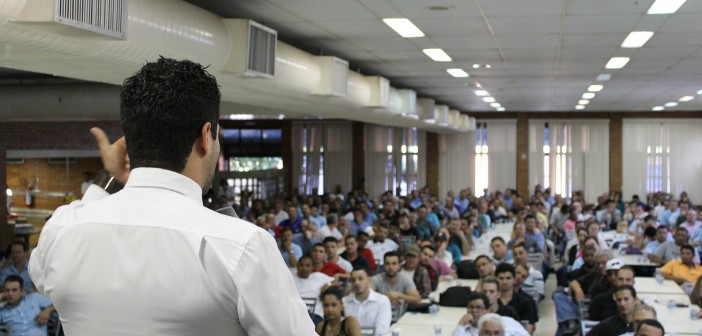Leaders communicate a lot, for leaders must find many and varied ways to keep the vision before the people. I have learned that I am reasonably good at communicative leadership, but now I know that less can often mean more when it comes to communicating.
I attended a university luncheon for all departmental heads on campus. Before the program began, the president asked me, “Would you be willing to give a two-minute summary of your chaplaincy programs so far this semester?” I said, “Sure,” as I gulped. I then sat down and began making a long, detailed list of all the programs and events accomplished since the beginning of the semester.
Leaders communicate a lot, for leaders must find many and varied ways to keep the vision before the people. I have learned that less can often mean more when it comes to communicating.
After lunch, the program began. First the president and then each of the five vice presidents gave 10-15 minute presentations updating us on their semester programs, each with charts, graphs, and statistics — all relevant, vital, and substantive. The program was to be over by 1:30 p.m., and it was 1:28 p.m. as I was finally called to the podium for my presentation.
Some people had already left; others were sitting with eyes glazed over. I remembered that the president had said to me, “Two minutes.” So I left my long list of notes at my table, walked to the podium, and spoke from my heart without notes:
Some twenty years ago, as the scud missiles hit the streets of Tel Aviv, the Muslim students at Ohio Wesleyan University (OWU) went to the rooms of the Jewish students of Ohio Wesleyan. They knocked on their doors, and said to them, “Do you have family in Tel Aviv? We want to be with you tonight, just to sit with you and to pray with you.” The next day, an Orthodox Rabbi in Columbus called me and said, “I heard about what happened last night. Do you realize that if the streets of Tehran and Tel Aviv were at Ohio Wesleyan, there would have been no war?!”
At Sundown last September 9 (2010), I sent a message to everyone at OWU. It said in part:
Beloved OWU Community:
As I write, millions of people around the globe have entered into an unusual juxtaposition of sacred time: the overlay of the beginning of Rosh HaShannah with the end of Ramadan and the subsequent celebration of Eid. We in the OWU community who are neither Jewish nor Muslim need to take heed that this is an unusually special moment for many sisters and brothers on campus.
As faculty, staff, and students all, I bid your sensitive awareness to these sacred hours in the lives of many of our community. Especially given the current tumult of social and political discourse regarding Jewish-Christian-Muslim relations in our nation, I bid your mindful, even prayerful, attention to these sacred days. If we are ever to be, as President Rock Jones has called us to become at Ohio Wesleyan, a “tight knit community,” such awareness, sensitivity, and support would be a good measure of such a vision.
Blessed be each of you, Chaplain Jon Powers
Soon I had a phone message from the president of Tauheed (the Muslim Student Association at OWU): “Chaplain, I shared your words with my roommates, and we are sitting here together, quite stunned, actually. My roommates are a Hindu, a Jew, and a Catholic, and I am a Muslim. You have described us! After I read your words to them, we sat looking at each other for a moment, in silence, kind of smiling at each other. It was as if we just realized that WE are OWU! Wow, chaplain, wow. Thanks.”
In the midst of a crazy world where Islamic-phobia is rampant, the talks in the Middle East are fragile, and Christian groups are encouraged to hate and mistrust each other in the name of Jesus Christ, I submit that Ohio Wesleyan University is a counter balance. This is how and why we are a rather special place. It is reflected in myriad ways throughout the year as Jewish, Christian, Hindu, Muslim, and Baha’i students study and serve together to explore their differences and discover their commonalities.
None of this happens at OWU by accident. This is who we are at our deepest and best selves. And this is who we have been since 1842. This is what makes everything we do worthwhile. This is what makes my work worthwhile.
When I sat down, it was 1:30 p.m. I had spoken for exactly two minutes.
The next day, the president said to me, “You captured in two minutes what we were all trying to say.”







